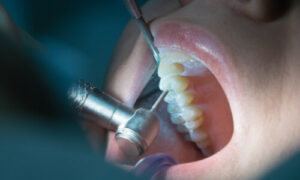Good oral hygiene, when performed regularly, can fight tooth decay and bad breath. This fact is common knowledge to everyone. However, although you religiously brush and floss your teeth, your dentist may still recommend deep teeth cleaning procedure. Why so? Maybe because you do not see your dentist at least twice a year, plaque and tartar buildup may be starting in hard-to-reach areas, away from your toothbrush’s reach. You may also experience gum bleeding, gum recession, and loose teeth, warranting a dental deep cleaning procedure. If this is the case, here is what we can say about this dental treatment and how a dental compressor can help your dentist perform this procedure safely and efficiently.
Plaque and Tartar Buildup
As we all know, plaque is a sticky coating that grows on the surface of the teeth. It is caused by mixing food particles with saliva and contains microorganisms. Brushing your teeth removes plaque, which forms on your teeth on a daily basis. On the other hand, brushing does not remove all plaque between the teeth.
Tartar is formed when leftover plaque calcifies or hardens. Gum disease can be caused by plaque or tartar buildup. Gingivitis, or gum inflammation, is one example of this. Gingivitis can progress to periodontitis if left untreated. This severe illness causes the bone that supports the teeth to deteriorate.
What is Dental Deep Cleaning?
 Deep teeth cleaning may eliminate plaque and tartar accumulation from your teeth, which can reduce gum inflammation, prevent gum disease, and improve gum health.
Deep teeth cleaning may eliminate plaque and tartar accumulation from your teeth, which can reduce gum inflammation, prevent gum disease, and improve gum health.
Deep teeth cleanings, also known as dental scaling and root planing, differ from routine teeth cleanings. Regular cleaning removes plaque and tartar from above the gumline. On the other hand, deep cleaning teeth involves the removal of plaque and tartar from below the gumline.
Gum or periodontal disease causes a space or gap between your teeth and gums, where tartar and plaque can become trapped. Cleaning below the gum line removes this buildup.
Is Deep Dental Cleaning Necessary?
You might need a deep cleaning if gum disease causes your gums to pull away from your teeth, creating a space greater than 5 millimetres (mm) deep. If gum disease worsens, the space between your gums and teeth can continue to widen. This can weaken the bones that support your teeth, causing loose teeth or tooth loss.
If your dentist recommends a deep cleaning, the benefits of this procedure include:
- stopping the advancement of gum diseases
- treating a current infection and promoting healing
- cleaning your teeth above and below the gumline
- eliminating bad breath caused by gum disease
- protecting the roots of your teeth
Is Professional dental cleaning painful?
For the most part, regular teeth cleanings or routine dental cleanings do not cause any pain. However, if you have sensitive teeth or existing gum disease, you may expect some stinging sensation. On the other hand, teeth scaling and root planing can cause some discomfort, so you’ll receive a topical or local anaesthetic to numb your gums. You can expect some sensitivity after your treatment. Your gums might swell, and you might have minor bleeding, too.
Good Dental Compressor: Its effect on Teeth Cleaning
 Now, you may wonder, what machines are responsible for performing this dental procedure? Well, aside from manual scalers and electric dental handpieces, a good-quality dental compressor can aid in producing powerful air and water pressure that can help break down and remove tartar buildup efficiently. If you have the correct pressure requirements for your procedure, your dentist or dental hygienist can surely perform your treatment with fewer risks of damage without compromising your safety and comfort.
Now, you may wonder, what machines are responsible for performing this dental procedure? Well, aside from manual scalers and electric dental handpieces, a good-quality dental compressor can aid in producing powerful air and water pressure that can help break down and remove tartar buildup efficiently. If you have the correct pressure requirements for your procedure, your dentist or dental hygienist can surely perform your treatment with fewer risks of damage without compromising your safety and comfort.
Choosing your dentist
Your dentist would always recommend maintaining good dental hygiene as the best way to prevent cavities and tooth decay. However, sometimes, you need something more. Deep teeth cleaning helps treat gum disease and get rid of bad breath. Deep cleanings have risks, so it’s important to understand possible complications or side effects.
Although gum scaling and root plain is a common and safe procedure, you can expect some sensitivity and swelling afterwards. But if your dentist uses dependable dental instruments and machines, side effects can be prevented.
If you’re a dentist who wants to build and improve their dental practice, why not get in touch with Cattani Compressors? We have a wide array of dental products from top manufacturers, so we can ensure that what we offer you is ideal for your practice. Call us at (02) 8880 9257 for more information on how our products, like the Cattani dental air compressors, can improve your dental practice.
References:
https://www.healthline.com/health/deep-cleaning-teeth
https://www.colgate.com/en-ph/oral-health/dental-visits/deep-cleaning-your-teeth-when-to-do-it-0314
https://www.webmd.com/oral-health/what-is-the-cost-deep-teeth-cleaning



